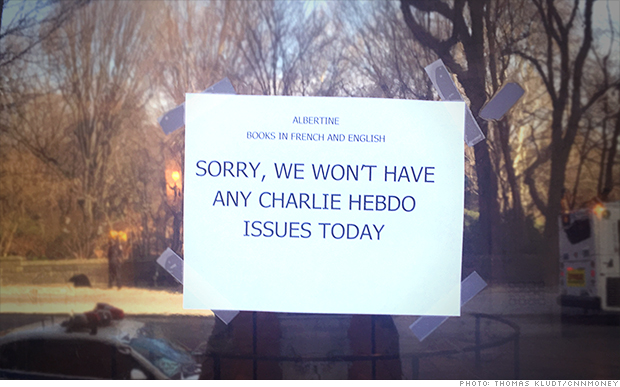
Charlie Hebdo sold out almost immediately in Paris, and millions of copies are being printed, but the once-obscure magazine was hard to find in New York despite demand for it.
NEW YORK (CNNMoney)
The message anticipated a question that employees of the French book shop had heard hundreds of times.
Stores and newsstands throughout New York that had never sold Charlie Hebdo had been inundated with inquiries from people who have probably never read the satirical magazine.
In New York City, at least, "I am Charlie" had become "Where is Charlie?"
The answer emerged on Friday morning with the arrival of what were likely some of the first copies of the magazine's latest issue in the United States.
The magazine, the first since the attack on Charlie Hebdo's offices that left 12 dead, sold out in Paris almost immediately and as many as 5 million copies are being printed. But getting the once-obscure publication to America wasn't easy.
Some newsstand distributors tried to work directly with Charlie Hebdo's distributors -- a task that turned out to be difficult, at least initially.
But places like Albertine and Book Culture, another Manhattan shop, went a different route.
The stores made arrangements with Emmanuel Saint-Martin, the owner of a website catering to French ex-pats who has fielded "thousands" of requests for the new issue.
Saint-Martin reached out to Uni-Presse, a French government-backed organization dedicated to promoting French culture and press throughout the world.
He arranged for Air France and La Compagnie, another French airline that flies to Newark Liberty Airport in New Jersey, to get the issues across the Atlantic.
And on Friday morning, about 20 copies then arrived via FedEx to the upstate New York home of Catherine Lamy, the East Coast representative for Uni-Presse.
She and Saint-Martin hope to get as many as 1,500 copies next week to send to other American cities. The first round went to a select few in New York.
So a little before 11:30 a.m. on Friday, an employee removed the sign from Albertine's door and Lamy entered ten minutes later. She had a white envelope. Nobody needed to ask what was inside.
She gave bookstore employees two copies. They examined the cover image -- a cartoon depiction of the Prophet Mohammed -- that has spawned renewed debates over free speech.
It was decided that one copy would be laminated for posterity, and the employees placed one copy on a windowsill sandwiched between two bookshelves.
One customer wanting to buy one was invited instead to read the issue near the window. He sat in one of the store's leather chairs and scanned the cartoons and articles. When he was finished, a young woman had her turn to read the magazine.
Albertine won't have copies to sell until next week.
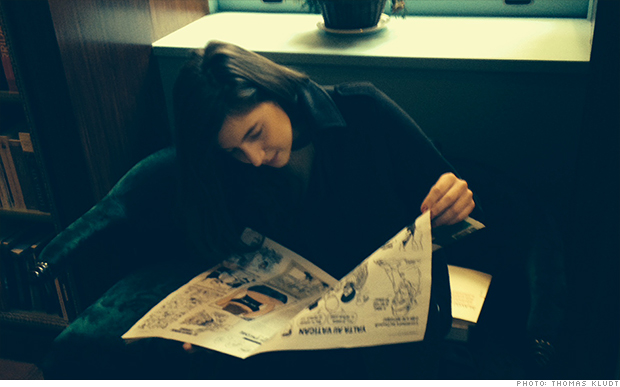
Albertine bookshop in Manhattan wasn't selling Charlie Hebdo at first, but it was letting customers sit and read the issue.
After an hour at Albertine, Lamy was off to her next destination: Book Culture, located on the other side of Central Park.
During the cab ride west, Lamy stressed that Uni-Presse will only provide copies to stores that pledge to make "no margin" on the transaction.
"We don't want to see this craziness you see on eBay," she said, referring to the markup on issues that have been sold on the online marketplace. "We're very clear to the stores on that."
She said Uni-Press hasn't collected any commission on Charlie Hebdo subscriptions since the attack.
We arrived at Book Culture, part of a three-store chain on Manhattan's Upper West Side. CBS News had a camera there. And a reporter for the Japanese television network TV Asahi stood outside the store.
"Are you here with the delivery?" the reporter asked Lamy.
With film crews capturing the footage, Lamy pulled a copy out of the white envelope and handed it Chris Doeblin, the store's owner.
"Beautiful," Doeblin said, holding up the Mohammed cartoon for everyone in the store to see. He plans to frame one of the copies for display. The other will be available for viewing. Doeblin hopes to get more to sell, but obtaining a mere two copies was still important to him.
For the last several days, the store's front window has displayed an enormous sign with the now-ubiqitous rallying cry, "Je suis Charlie."
Doeblin said the sign has "garnered some ill will."
He's thought about the security risk of associating with the magazine, but said he's "not that concerned about it."
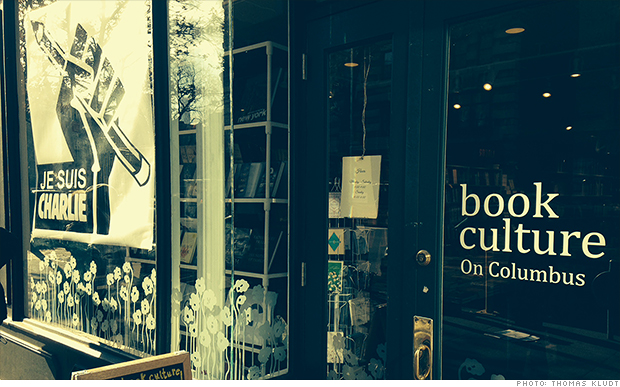
Book Culture plans to frame one of the Charlie Hebdo covers for display in the store.
Book Culture employees paged through one of the copies behind the store's counter. A customer asked if any issues were for sale. John R. MacArthur, the president and publisher of Harper's Magazine, eventually strolled in and made small talk with Lamy. Harper's has a partnership with the store.
"We're not Charlie Hebdo in style, but we are in spirit," MacArthur said of his magazine.
As the news crews filed out of the store, Lamy was joined by Saint-Martin, whose website had received thousands of requests for the magazine
The two made plans to deliver the remaining issues Lamy had with her that day. One was going to a man in Brooklyn who called last week to start a subscription.
Lamy wouldn't disclose where the other dozen-plus copies were going. She said those recipients did not want to be identified.
First Published: January 17, 2015: 9:05 AM ET
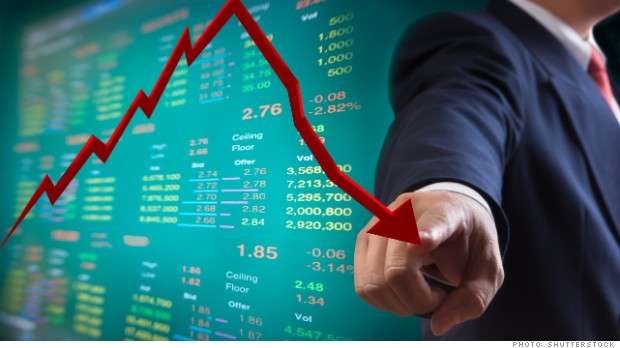 Stocks have been having a pretty bad 2015 so far.
Stocks have been having a pretty bad 2015 so far. 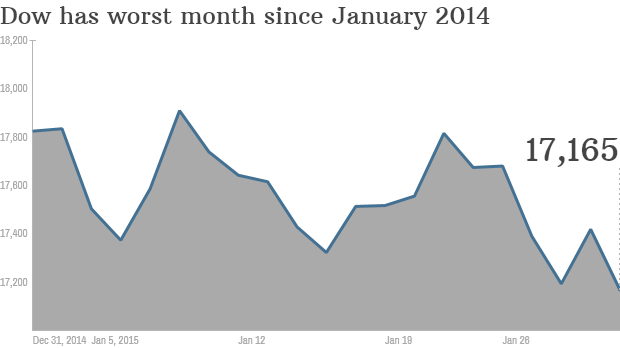
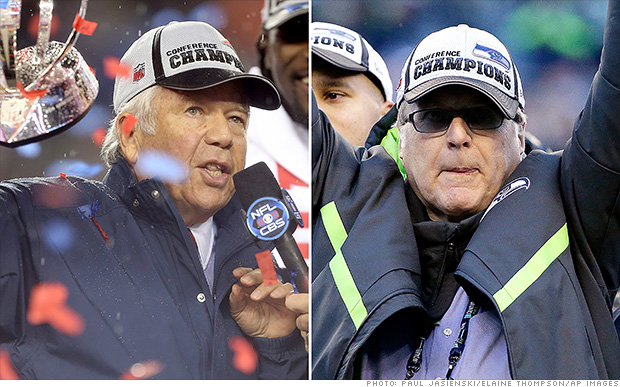 Bob Kraft, left, and Paul Allen, right, owners of the two Super Bowl teams, made their fortunes in very different ways.
Bob Kraft, left, and Paul Allen, right, owners of the two Super Bowl teams, made their fortunes in very different ways. 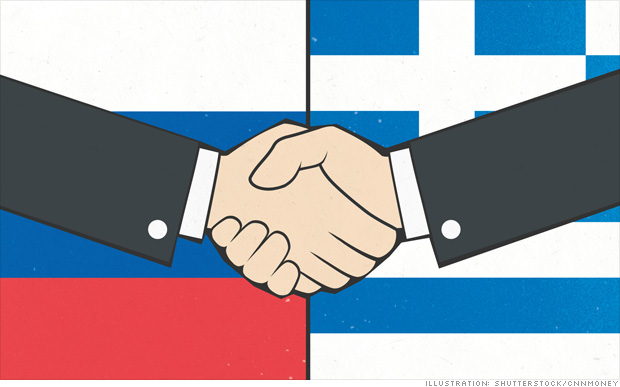
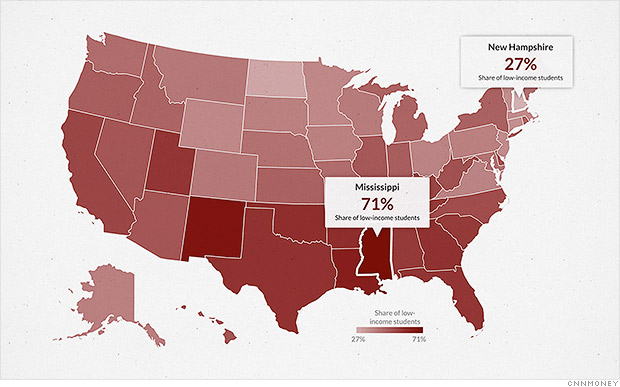
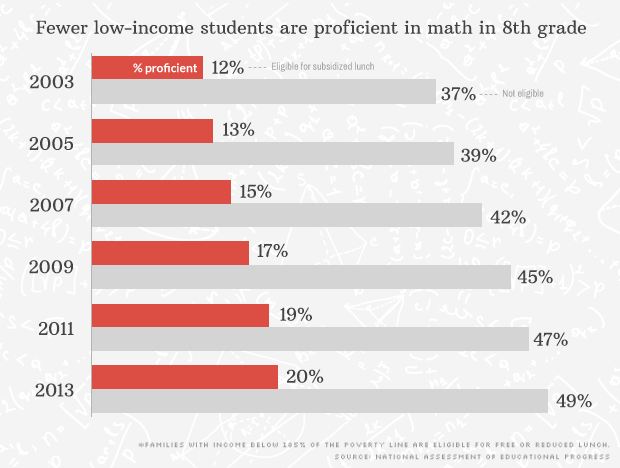
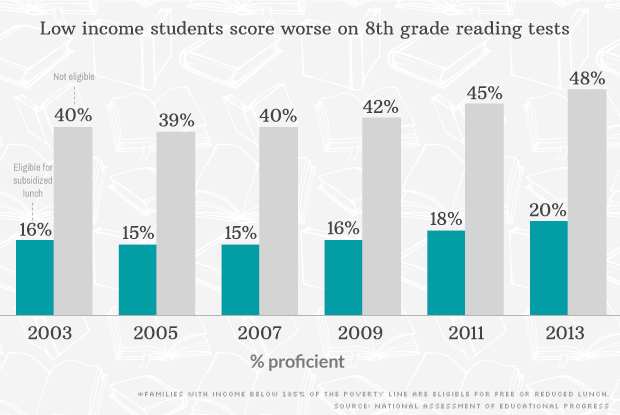
 SpongeBob SquarePants is one of Nickelodeon's most popular shows.
SpongeBob SquarePants is one of Nickelodeon's most popular shows. 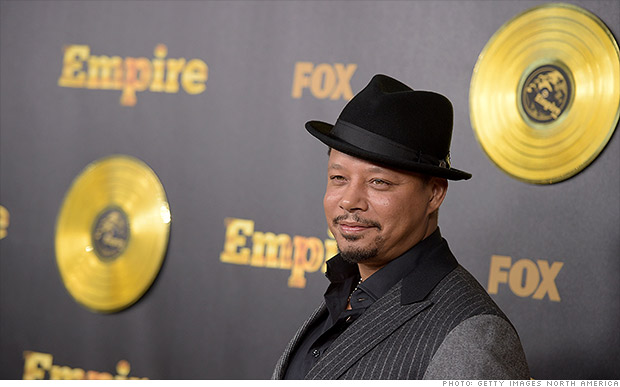 According to Nielsen, 61% of the show's audience is African-American -- a figure that no other prime time show, new or old, even comes close to matching.
According to Nielsen, 61% of the show's audience is African-American -- a figure that no other prime time show, new or old, even comes close to matching. 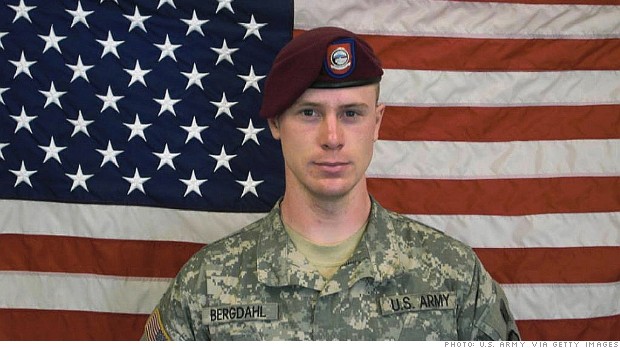
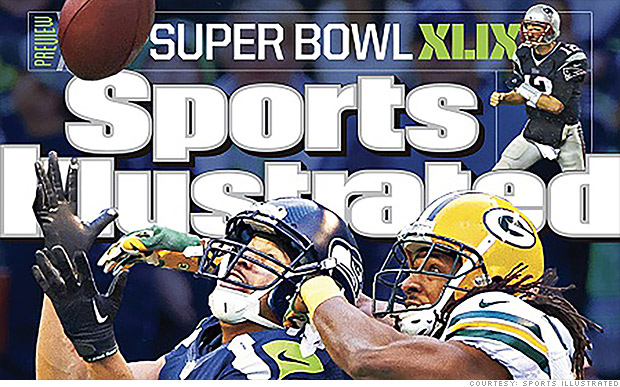 Sports Illustrated, which boasts a long history of indelible photos, laid off all six of its staff photographers this week.
Sports Illustrated, which boasts a long history of indelible photos, laid off all six of its staff photographers this week. 
 Stores in New York City that sold the Charlie Hebdo issue depicting the Prophet Mohammed on it's cover following the deadly massacre at its publisher's office in Paris are getting increased police protection.
Stores in New York City that sold the Charlie Hebdo issue depicting the Prophet Mohammed on it's cover following the deadly massacre at its publisher's office in Paris are getting increased police protection. 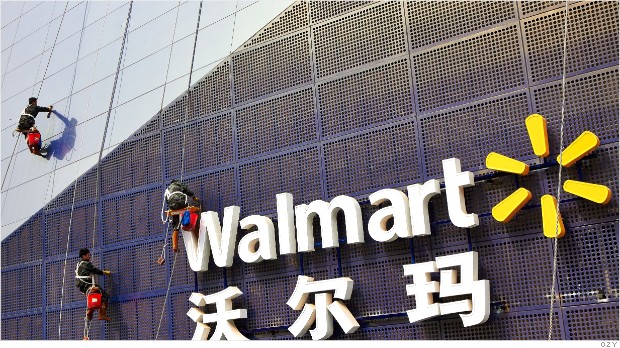 Walmart in China
Walmart in China 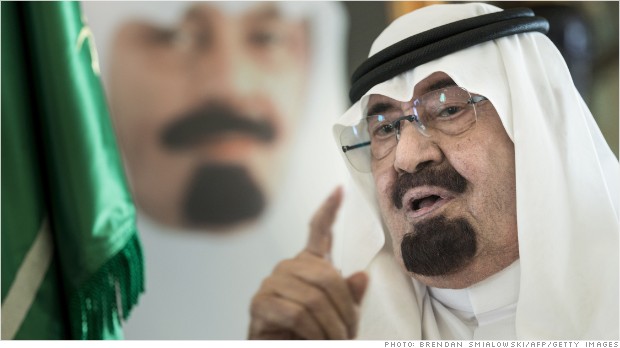 Saudi Arabia's late King Abdullah bin Abdulaziz al Saud.
Saudi Arabia's late King Abdullah bin Abdulaziz al Saud. 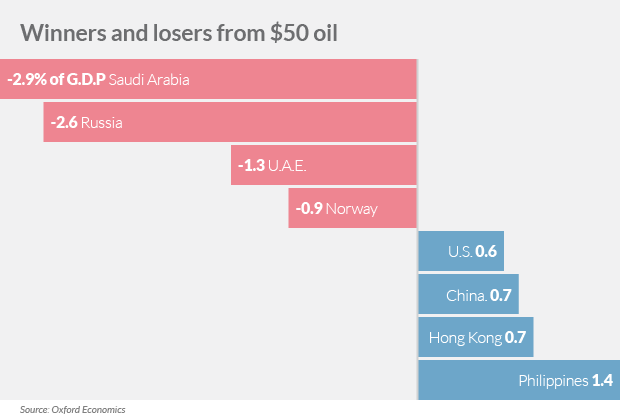
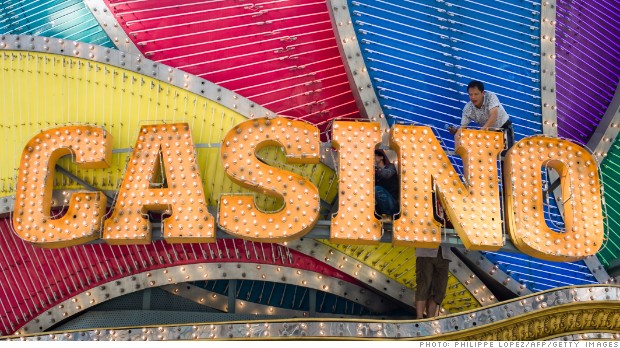
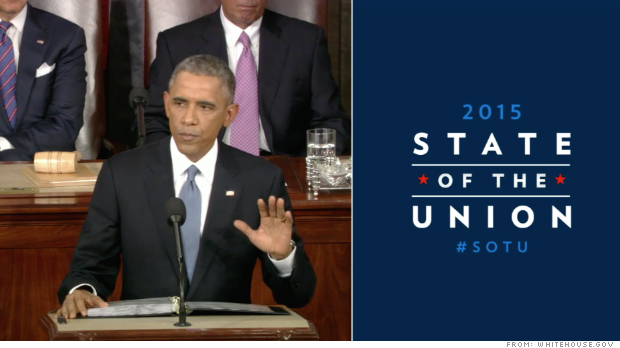 President Obama delivers the 2015 State of the Union address to Congress.
President Obama delivers the 2015 State of the Union address to Congress. 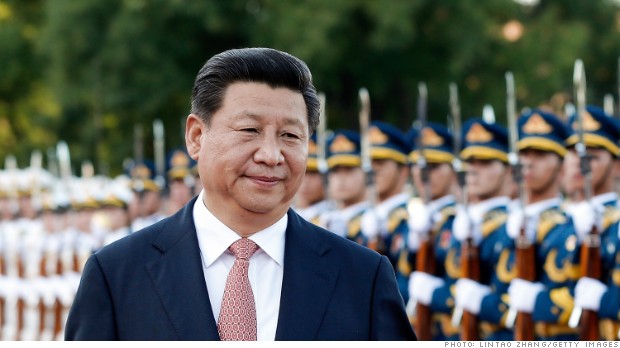 Turns out China's President Xi Jinping only makes about $22,000 a year.
Turns out China's President Xi Jinping only makes about $22,000 a year.  Charlie Hebdo sold out almost immediately in Paris, and millions of copies are being printed, but the once-obscure magazine was hard to find in New York despite demand for it.
Charlie Hebdo sold out almost immediately in Paris, and millions of copies are being printed, but the once-obscure magazine was hard to find in New York despite demand for it.  Albertine bookshop in Manhattan wasn't selling Charlie Hebdo at first, but it was letting customers sit and read the issue.
Albertine bookshop in Manhattan wasn't selling Charlie Hebdo at first, but it was letting customers sit and read the issue. 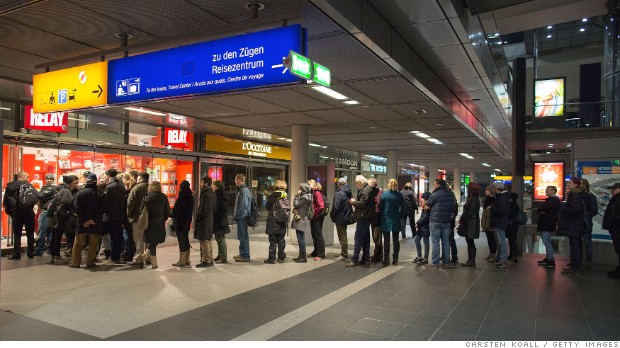 Customers in Germany lined up on Saturday to buy the new edition of Charlie Hebdo.
Customers in Germany lined up on Saturday to buy the new edition of Charlie Hebdo. 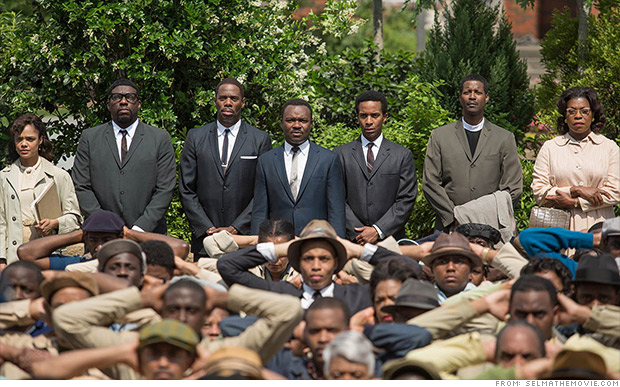 Many felt that David Oyelowo's performance in "Selma" was grossly overlooked.
Many felt that David Oyelowo's performance in "Selma" was grossly overlooked. 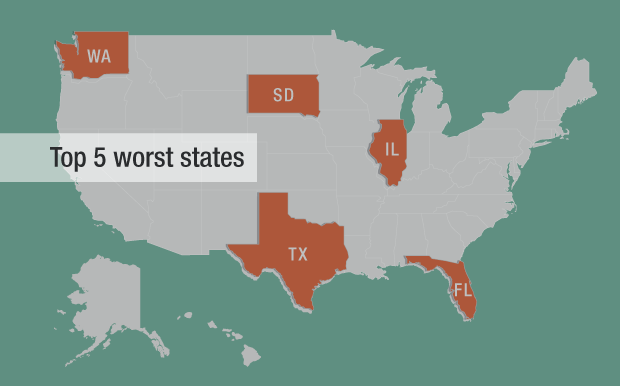 In these five states, the poor are paying a far larger share of their income toward state and local taxes than the top 1%.
In these five states, the poor are paying a far larger share of their income toward state and local taxes than the top 1%.